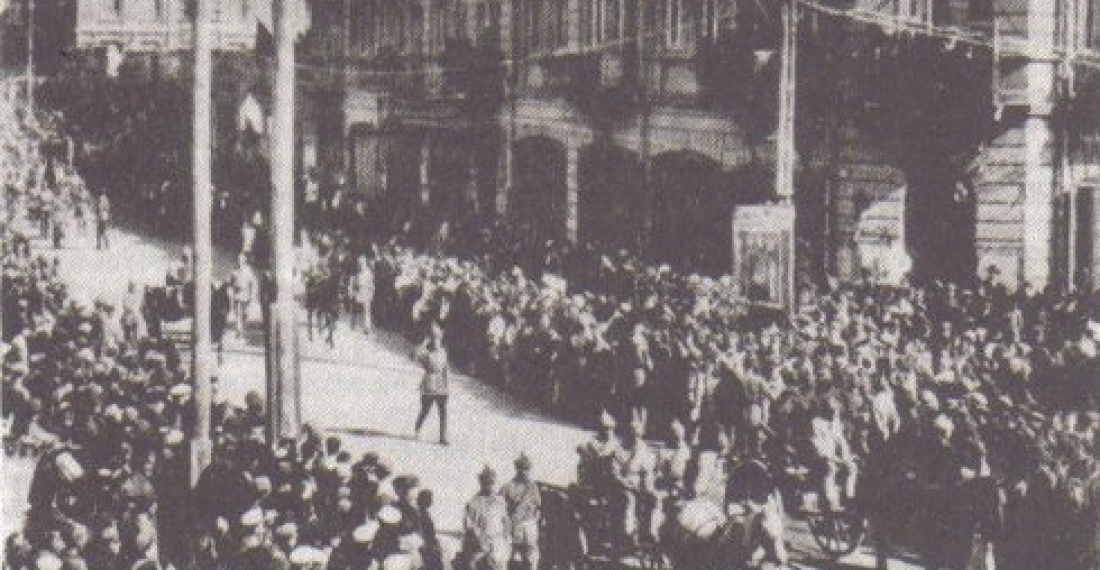Armenia is marking the 100th anniversary of the establishment of the first Republic in May 1918. Alexandre Petrossian, a young political analyst based in Yerevan reflects on the difficulties encountered by the founding fathers but says"if there had not been the first republic, there would have not been Soviet Armenia, nor the current third republic of Armenia." Petrosyan was speaking at an event held in Tbilisi on 11 May 2018 during which participants from Armenia, Azerbaijan and Georgia joined together to mark the 100th anniversary of modern statehood in the South Caucasus.
related content: 1918: "The golden period of Georgian politics"
Shortly, the three countries in our region will celebrate the centennial anniversary of their statehood.
The last century was dramatic: it started with the collapse of the Russian and Ottoman empires, because of which Azerbaijan, Armenia and Georgia established their independence, and appeared on the political map of the world. This didn't last long. Soon the Bolshevik empire emerged and isolated us from the rest of the world. The Bolshevik Army entered Yerevan in November 1920. After the Soviet blockade, national agendas started dominating in the region. Today, though we are independent, we pursue various visions of the future, we have various internal and external aspirations, often contradictory to each other's and we have various perceptions of the realities.
As was the case of many nations at the time. Armenians in 1918 desired independence. However, the Armenian national Council, that had been active on the ground since the beginning of 20th century was, truly speaking, not ready for independence. The founding fathers had to cope with many internal and external threats. First, more than half of the population of Armenia was composed of survivors of the genocide. This created a range of problems that was undermining the existence of the newly established republic. Armenia was facing a harsh famine. Many diseases were spread, and the government lacked the necessary resources to cope with all these issues. Second newly independent Armenia found itself in a difficult geo-political environment, caught in conflict, military aggression, and between the continued genocidal foreign policy of Turkey and the threats coming from the Bolshevik revolution.

The Ataturk-Lenin alliance was trying to absorb all territories which they saw as obstacle on the way of their revolutionary goals. People hoped that in some way the Treaty of Sevres would in some way compensate Armenians for the suffering of the genocide, but the Sovietisation of Armenia hindered this possibility.
However, if there had not been the first republic, there would have not been Soviet Armenia, nor the current third republic of Armenia. Given the short existence of the first republic of Armenia one can also say that it registered several achievements. Armenia was a parliamentary republic with a multi-party system. It is also worth mentioning that women had the right to vote, and there were women members of parliament. Moreover, also national minorities were represented in the parliament. Overall, the short existence of the first republic of Armenia laid the foundations of democratic governance, and revived Armenian statehood. Therefore, May 1918 has a greater impact on Armenia's national identity than 21 September.
For me it is obvious that the competing and contradictory national agendas still hinder the possibility of long lasting co-operation and peace in our region, an aspiration that should not be considered an idealism. After all, if it was possible to do this in Europe after two world wars, then it is possible for it to be done in our region as well. These days we are again living a historical moment in Armenia. For the first time since 1991 we are witnessing real democratic processes which I hope will lift my country onto a new level on the democratic map of the world. I am sure, and I strongly believe, that not only Armenia will benefit from these processes, but also the whole region. We need smart solutions to solve the obsoleted problems and failed methods of the past, and to work together to build democracy and a peaceful future. Let's make our region strong again!
source: Alexandre Petrossian is a young Armenian political analyst based in Yerevan. He was speaking at an event held in Tbilisi on 11 May 2018 during which participants from Armenia, Azerbaijan and Georgia joined together to mark the 100th anniversary of modern statehood in the South Caucasus.The event was organised by LINKS (DAR) and the Borjomi Innovators Network. Read more about the event here
photo: The Soviet Army enters Yerevan in 1920, crushing the hopes of Armenian independence






